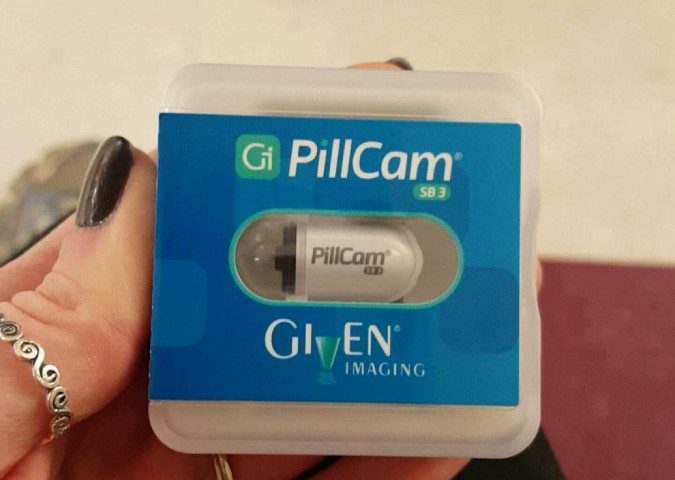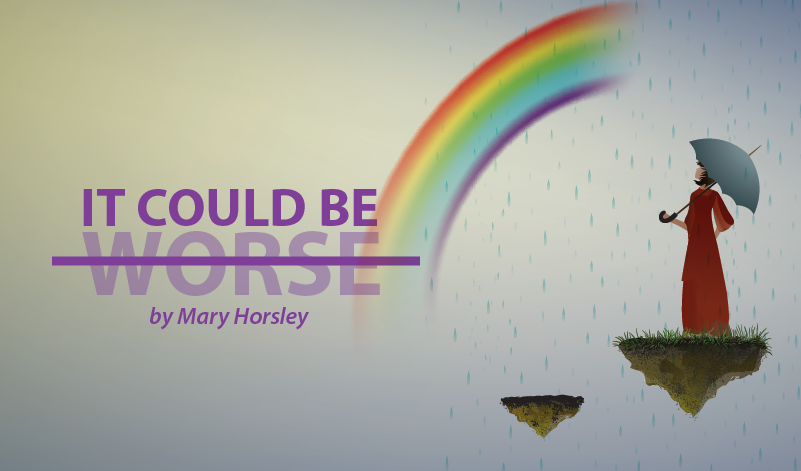Editor’s note: This is the second in a series of columns by Mary Horsley about IBD-related procedures.
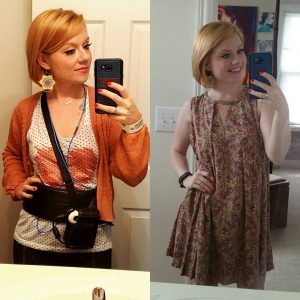
Continuing with my “Scope Series” theme, the next procedure that I’ve undergone, and am discussing here, is what is called a “pill capsule endoscopy”. The name itself gives you an idea of what this procedure entails: taking a pill that carries a little camera to take images, working much like a colonoscopy or endoscopy but without doctors or anesthesia.
Unlike other endoscopies, this one can see from top to bottom: the entire digestive system and potential areas of Crohn’s inflammation. With some Crohn’s disease patients, inflammation is inside the small bowel, and cannot be viewed in a colonoscopy or endoscopy alone. My Crohn’s disease is small bowel specific, so I have had two of these capsule endoscopies — one for diagnosis and another for a disease progression check-up.
Usually, when you arrive at your doctors’ office, you are given the capsule and a small glass of water. Although not a fan of taking medication, I found the pill was surprisingly easy to swallow. Remember to wave ‘hello’ to your doctor before swallowing the camera, as it starts taking photos as you pick it up to ingest.
As with other scope preparations, pre-procedure fasting is required. Not only do you not get to eat food the night before, but after 8 p.m. you cannot have liquids (including water) either. Don’t worry, a few hours into the scope and you can begin drinking water, and soon eat food, too. You are allowed to resume your normal daily activities, given a few rules.
You may find yourself constantly adjusting everything, and never quite being comfortable. At least, that’s my experience: the cords, the belt, the battery receiver — there is a lot happening.
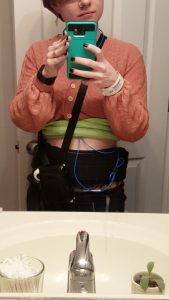
Because of the risk of an obstruction, you’ll be advised of essential rules.
For the procedure: You can’t lie down. You can’t bend over. You can’t move too much for fear of lodging the camera inside your body into a “funny position” within the turns or folds of your stomach, within areas of inflammation, or within the problem areas like strictures or ulcers.
Once with your doctor, you swallow the camera inside a pill — it was around the size of my thumb — and you are given a receiver to wear that picks up images from the capsule’s camera as it moves through your body. The camera takes around 10-15 images per second, a series of images that view almost like a movie for doctors to review.
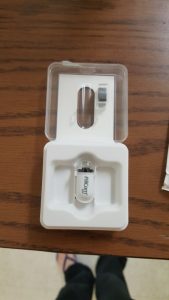
Personally, my hips hurt from wearing the heavy belt all day, and my neck started to ache from having something rubbing on it all day. The plus is that your entire body is being viewed, especially your Crohn’s disease. The downside is the risk of the camera getting stuck, which would lead to surgery. Another is finding inflammation but not being able to biopsy or review it in real time.
Around eight hours later, or when the battery pack begins to run down, you will be asked to return the equipment so a specialist can read the images; the receiver is returned, not the camera itself.
This means that, without problems like blockages or narrowing, the camera will eventually exit your body later, sometimes still blinking with battery life.
A pill capsule endoscopy was one of the easier procedures for me, as it didn’t require much other than wearing a belt and battery pack. Later, I had a double balloon endoscopy and an emergency surgery for a perianal abscess that led to a fistulotomy. (I’ll discuss those procedures in upcoming columns.)
Getting these scopes can help in diagnosing and managing your disease, and I can only suggest discussing them with your doctor.
My experiences may be different than yours, but you never can be too prepared for what could happen with Crohn’s disease or IBD.
Because for me, It Could Be Worse.
Note: IBD News Today is strictly a news and information website about the disease. It does not provide medical advice, diagnosis, or treatment. This content is not intended to be a substitute for professional medical advice, diagnosis, or treatment. Always seek the advice of your physician or another qualified health provider with any questions you may have regarding a medical condition. Never disregard professional medical advice or delay in seeking it because of something you have read on this website. The opinions expressed in this column are not those of IBD News Today, or its parent company, BioNews Services, and are intended to spark discussion about issues pertaining to inflammatory bowel disease.

